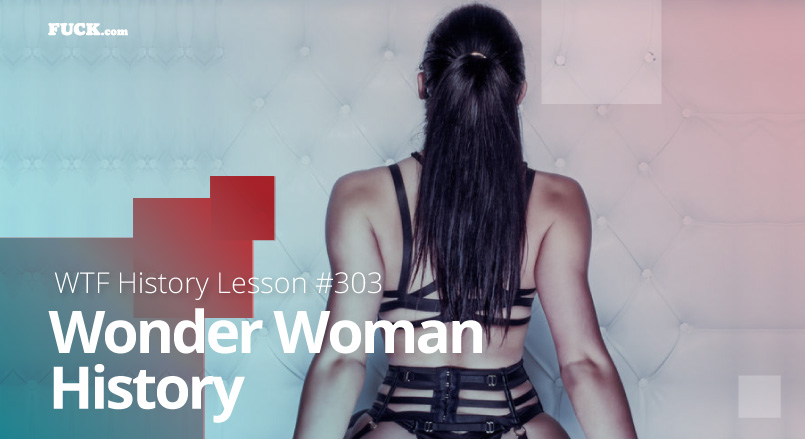She's the biggest and best-known female superhero, and in 2017 she's finally getting her own movie– Wonder Woman is one of the most iconic characters in comics. But the story of the character is stranger and more complex than many fans know, and Wonder Woman is one of the few superheroes where the apparent kink of the comics is reflected in history.

WTF History Lesson #303: Wonder Woman History
Wonder Woman was the creation of William Moulton Marston, with some input from his wife, Elizabeth Holloway Marston, who is said to have proposed the idea of a female character. She first appeared at the end of 1941, following a trend of male heroes like Superman, Batman, Captain Marvel and Captain America.
She wasn't the first female superhero
– that honour goes to Fletcher Hanks' bizarre skull-faced jungle heroine Fantomah – but she was the first one to take off in a big way, getting her own comic shortly after her first appearance. Young readers enjoyed the adventures of the world's strongest woman, which contained not only thrilling fight scenes but oddball comedy and warm-hearted moral messages. Older readers also enjoyed the amount of time Wonder Woman spent chained up or wrapping people in her magical lasso, but that was just dirty-minded adults reading sexual content into a kids' comic, right?
Well ... maybe.
Unlike other superhero creators, Marston wasn't a professional writer or artist. He was a psychologist, a Harvard graduate who had contributed to the development of the lie-detector test. In 1940, comic publisher Max Gaines read an interview with Marston in which he claimed comic books had educational value; pleased at the idea of getting an expert's support, Gaines hired Marston to consult for his publishing firm and then asked him to develop a new superhero.
The rest is Wonder Woman history.
A closer examination of the history reveals some odd facts. For instance, the article in which Gaines read about Marston was written by a journalist named Olive Richard. Richard was, in fact, a pseudonym for Olive Byrne, a former student of Marston's who was actually in a relationship with the Marstons at the time. She was also living with him when she wrote the article. Byrne had two children with William Marston and continued to live with Elizabeth after Marston's death in 1947.
(There's a lot more to be said about Olive Byrne and Elizabeth Holloway Marston, both of whom had fascinating lives. Byrne was the niece of American birth control pioneer Margaret Sanger, while Elizabeth was a lawyer with an MA in psychology in an era where few women were working in either field. Comic book historians have called both of these smart, determined women “the real Wonder Woman.” Byrne even wore a distinctive pair of bracelets that may have inspired the Amazon heroine's.)
This unconventional relationship wasn't the only thing unusual about William Marston's views on sex. Far from being something kinky adults projected onto the story-
all the bondage in Wonder Woman's adventures had a deeper meaning for its creator.
Marston believed that people with “pep and unbound force” – men, mainly – needed to learn to enjoy submission to loving authority, and that this submission would ensure a peaceful future for mankind. And, of course, the best way to make loving submission appealing was to make it erotic – the “Love Allure” of a strong woman like Wonder Woman made submitting to her a pleasurable experience.
For Marston, therefore, femdom was not only a fetish but actually a way to world peace. Indeed, it may only have been a way to world peace. Although it's hard to know for certain, there's no real evidence to suggest that Marston himself was particularly kinky in practice. Marston died at the age of 53 in 1947, but profitable superheroes are immortal. Wonder Woman continued in the hands of other creators, who naturally introduced their own ideas and often downplayed what they saw as Marston's stranger views.
Wonder Woman history remains one of the strangest and most fascinating in comics.
If you'd like to learn more about Olive Byrne, Elizabeth Holloway Marston and William Marston, Jill Lepore's The Secret History of Wonder Woman is a great place to start.
Hey Popcorn.dating Buddies,
Wanna write for Popcorn.dating? We LOVE having guest authors! Send us a message and get featured on the magazine.
With love and consensual hugs,
The F*cking Editor
Join the conversation
You are posting as a guest. If you have an account, sign in now to post with your account.
Note: Your post will require moderator approval before it will be visible.
There are no comments to display.